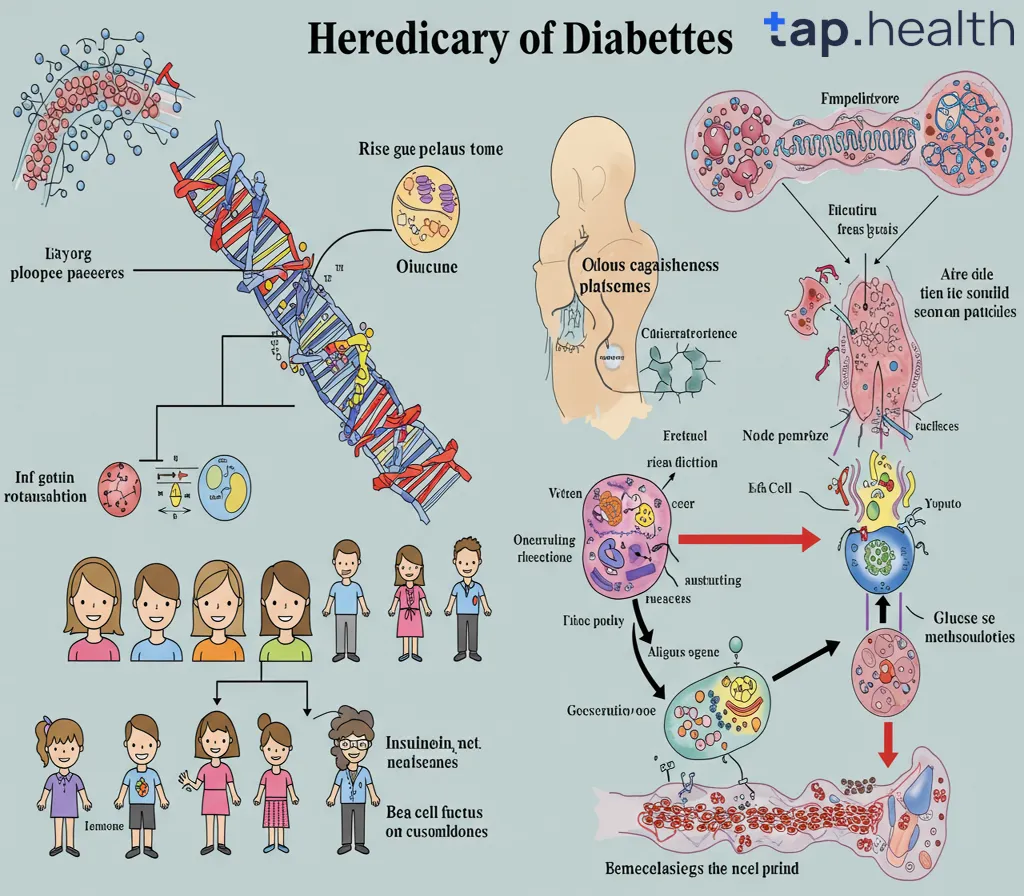Diabetes is one of the most common chronic diseases in the world, and its prevalence continues to rise, especially in countries like India. Type 2 diabetes, in particular, has garnered significant attention in recent years, with a growing number of cases among people of all ages. One of the most commonly asked questions is whether type 2 diabetes is hereditary. In this article, we’ll break down the science behind type 2 diabetes, explore the role of genetics in the disease, and provide real-life scenarios, expert contributions, and proven recommendations for prevention.
What is Type 2 Diabetes?
Before diving into whether type 2 diabetes is hereditary, it’s important to understand what this condition is.
Type 2 diabetes is a metabolic disorder that affects how your body processes glucose (sugar). In a healthy body, the pancreas releases insulin, a hormone that helps cells absorb glucose for energy. However, in people with type 2 diabetes, the body either doesn’t produce enough insulin or the cells become resistant to it, leading to high blood sugar levels.
Some of the most common symptoms of type 2 diabetes include:
- Increased thirst
- Frequent urination
- Fatigue
- Blurred vision
- Slow-healing sores
While these symptoms might seem mild at first, if left untreated, they can lead to more serious complications, such as heart disease, kidney failure, and nerve damage.
Is Type 2 Diabetes Hereditary?
One of the most frequently asked questions is whether type 2 diabetes is hereditary. The short answer is yes, there is a genetic component to type 2 diabetes. However, genetics is not the only factor involved. Lifestyle choices, such as diet, physical activity, and body weight, play an equally important role in the development of the disease.
Let’s break it down:
Genetic Factors
Genetics play a significant role in the risk of developing type 2 diabetes. If you have a family member with type 2 diabetes, your risk of developing the condition increases. Research has shown that if a parent has type 2 diabetes, the child’s risk of developing the disease is 40% higher. If both parents have type 2 diabetes, the risk increases to 70%.
Certain genes have been identified that can affect insulin sensitivity and glucose metabolism, making some people more predisposed to the condition. However, having these genes doesn’t mean you will definitely develop diabetes—it just means you may be more at risk.
Lifestyle Factors
While genetics contribute to the risk, lifestyle factors are just as important. A sedentary lifestyle, poor diet (high in sugar and processed foods), and being overweight or obese can increase the chances of developing type 2 diabetes. In fact, obesity is one of the leading causes of insulin resistance, which is a hallmark of type 2 diabetes.
The good news is that even if you have a family history of type 2 diabetes, making healthy lifestyle changes can reduce your risk of developing the disease. Regular physical activity, a balanced diet, and maintaining a healthy weight can go a long way in preventing the onset of type 2 diabetes, even if you have genetic predisposition.
Real-life Scenarios
Example 1: Ramesh’s Story
Ramesh, a 45-year-old man from Chennai, has seen his father, uncle, and older sister suffer from type 2 diabetes. His family history has made him aware of his own risk. Ramesh leads a sedentary lifestyle and often indulges in unhealthy snacks, including sugary foods and deep-fried items. He weighs 100 kilograms and has been feeling increasingly fatigued.
After visiting his doctor for a routine checkup, Ramesh was diagnosed with prediabetes. His doctor advised him to lose weight, exercise regularly, and change his diet. Although Ramesh has a family history of diabetes, the doctor emphasized that lifestyle changes can help prevent or delay the progression of type 2 diabetes.
Example 2: Priya’s Preventive Measures
Priya, a 28-year-old woman from Delhi, has a family history of type 2 diabetes, with both her parents diagnosed in their 50s. Priya is aware of her genetic predisposition but is proactive about maintaining a healthy lifestyle. She follows a balanced diet, exercises regularly, and maintains a healthy weight. At her recent checkup, her blood sugar levels were normal, and her doctor praised her for taking preventive measures.
Priya’s story highlights the importance of proactive health management. Even though she has a genetic risk, her healthy lifestyle has helped her maintain normal blood sugar levels, preventing the onset of type 2 diabetes.
Expert Contributions
Dr. Rajesh Kumar, an endocrinologist based in Mumbai, states, “Genetics plays a crucial role in type 2 diabetes, but it’s not the only factor. Lifestyle choices, such as diet and physical activity, can help reduce the risk significantly. If you have a family history of diabetes, it’s essential to monitor your health closely and make preventive changes to your lifestyle.”
Dr. Kumar’s insight reinforces the importance of lifestyle changes in managing the risk of type 2 diabetes, even in individuals with a genetic predisposition.
Recommendations Grounded in Proven Research
To help reduce the risk of developing type 2 diabetes, follow these proven recommendations:
1. Maintain a Healthy Weight
Being overweight is one of the most significant risk factors for developing type 2 diabetes. Research shows that losing just 5-10% of your body weight can significantly lower your risk.
2. Eat a Balanced Diet
Focus on whole foods like fruits, vegetables, whole grains, lean proteins, and healthy fats. Limit processed foods, sugary drinks, and high-fat foods. The Mediterranean diet, which emphasizes fruits, vegetables, and healthy fats like olive oil, has been shown to improve insulin sensitivity and reduce the risk of diabetes.
3. Exercise Regularly
Aim for at least 150 minutes of moderate-intensity exercise each week. Activities like walking, cycling, swimming, and strength training can improve insulin sensitivity and help maintain a healthy weight.
4. Monitor Blood Sugar Levels
If you have a family history of type 2 diabetes, it’s important to monitor your blood sugar levels regularly. Early detection of prediabetes can lead to lifestyle changes that may prevent the development of diabetes.
5. Avoid Smoking and Limit Alcohol
Smoking and excessive alcohol consumption can increase your risk of developing type 2 diabetes. If you smoke, consider seeking support to quit. Limiting alcohol to moderate levels (one drink for women and two for men per day) can also reduce your risk.
Frequently Asked Questions (FAQ) on Is Type 2 Diabetes Hereditary
Q1: If my parents have type 2 diabetes, will I definitely get it?
No, having a family history of type 2 diabetes increases your risk, but it doesn’t guarantee you will develop it. Lifestyle choices like diet, exercise, and weight management play a crucial role in determining whether you will develop diabetes.
Q2: What age should I start worrying about type 2 diabetes?
It’s important to start thinking about your risk for type 2 diabetes in your 30s or 40s, especially if you have a family history of the disease. However, it’s never too early to adopt healthy habits to reduce your risk.
Q3: Can type 2 diabetes be reversed?
While type 2 diabetes cannot be fully reversed, it can be managed effectively with lifestyle changes. In some cases, people can achieve normal blood sugar levels through diet, exercise, and weight loss.
Q4: How can I reduce my risk of type 2 diabetes?
You can reduce your risk by maintaining a healthy weight, eating a balanced diet, exercising regularly, avoiding smoking, and limiting alcohol intake.
Conclusion
Type 2 diabetes is influenced by both genetic and lifestyle factors. While having a family history of the disease increases your risk, making healthy choices can significantly reduce that risk. By maintaining a healthy weight, eating a balanced diet, and staying active, you can improve your chances of avoiding or managing type 2 diabetes. Stay informed, take control of your health, and consult a healthcare professional for personalized guidance.



